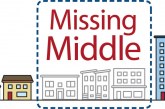 Two weeks ago, the Vanguard pointed out that the Commission Review of Development Proposals had shortcomings that had failed to address the key concerns that arose due to the recent Measure J vote.
Two weeks ago, the Vanguard pointed out that the Commission Review of Development Proposals had shortcomings that had failed to address the key concerns that arose due to the recent Measure J vote.
When these concerns were presented to council and other concerns were mentioned by a member of the public, the council made the decision to pull the item back and make some changes to it. However, from our reading of this item it still lacks two key components. First, there is no provision as to the timeline in which these issues would be heard by a commission. Second, while the new item does expand the purview of required review to include the Budget and Finance Commission, a large step up, there would seem that we could fairly reliably give direction to staff when other commission should review. More on that shortly.
Now it reads, “When there are inconsistencies or when a proposal has outstanding characteristics in a certain area, staff will determine which commissions need to review the proposal and provide information to commissions on specific issues of concern. Commission review will occur before proceeding to mandatory commissions or to City Council.”
I think that is attempting to address both of those concerns. But I think it should be more specific. For instance, with Measure P, we saw the Planning Commission get the item in July right before the council would weigh in on it. Given the timeline, they pretty much had to act on it. There was no margin built in. The Budget and Finance Commission was even worse in terms of timing, the night before the council would approve the development agreement.
What needs to occur here, is that there needs to actually be a timeline laid out so that each commission that needs to weigh in can do so without virtually being force to push something through. The council here could set forth an actual timeline that would allow commissions to hear the proposals several months prior to the point at which they come to council. That involves planning carefully and getting things like and EIR done in advance.
The second change involves making the Finance and Budget Commission mandatory. “The Finance and Budget Commission will also review fiscal and budgetary implications of development proposals.” That’s a good change. I know that commission has been pushing for that for some time. So that’s a good move.
What I do not understand is the reluctance to write in some scenarios where other commissions become mandatory.
With two of the previous projects – Willowbank and Simmons – the issue of bike path came up. It seems to me that they could write language into this that would make the Bicycle Commission Review mandatory when the issue of bike paths come up. Likewise, there are periodically issues of removing trees that come up and the tree commission needs to weigh in. Open space can become an issue at times, and that commission ought to have a say. The Senior Citizens Commission should be able to weigh in on issues involving accessibility. It may be that they could hold joint meetings with the Social Services Commission as these issues overlap.
I am fine with the language that most of these commission do not need to have final authority on a proposal as the Planning Commission would or the Historic Resources Management Commission does under some conditions. It makes sense that the Finance and Budget Commission would only express concern if the fiscal impact is a problem. Or that the Bicycle Commission would only make a recommendation about bike paths not about whether to put a project in.
However, to me the two biggest problems where at what point should a commission weigh in and which ones should do so. Personally other than the Planning Commission which has a formal role, the Commissions ought to weigh in very early and be able to make recommendations to city staff and the developer early so that their suggestions can be taken into account. A lot of problems would be avoided if we practiced this.
Unfortunately, while I both appreciate the willingness of the subcommittee to revise and improve the recommendation, it is just not there yet. I would hope that the subcommittee revises this one more time and this time, puts in a timeline and contingencies for other commissions to have review authority. That does not mean there will not be some sort of discretion to add additional commissions, but it seems to me we are not utilizing commissions as we should in a lot of these cases and the top culprit is time.
We simply do not get projects in a timely manner that would allow for reasonable review. Instead everything is rushed at the end. That is a problem that goes beyond this subject, but it creates a large amount of problems. We need to calendar items backwards. Figure out when we need to have the project sent to council and give the council enough time that they can say, hey take this back and work on it. This only really comes into play when we are talking about Measure J projects that have election deadlines. But for some reason, even Willowbank was rushed through when they could have gone back and firmed up some of the proposals.
—David M. Greenwald reporting






Excellent summation of the problems with this proposal by the Subcommittee on Commissions. It essentailly leaves things status quo – not solving anything. City staff is still left total discretion as to whether commissions are ever involved in the political process, and no attempt is made to make sure proposals are sent to commissions in a timely manner. And this, even after both you and I alerted the Subcommittee on Commissions to these problems with it. The Subcommittee on Commissions needs to go back to the drawing board and make some more changes…
The current Council Majority are essentially the same people (or their political “clones”) in the last two Council cycles since Measure J was passed in 2000. Their plan, with City Manager Emlen’s help to thwart Measure J’s citizen power has always been to make it as difficult as possible for information that they cannot control to get out to the voters. This has always entailed trying to make the time between when the development comes up on the citizen’s radar and the time for a Measure J vote as short as possible, bringing up the issues at very late hours in Council session and, a new “wrinkle” that was added with Measure P, cutting out the input of important citizen commissions. This strategy has failed dismally with Measure J and Measure P and we are seeing grudging gestures acknowledging this fact, not any embracing of the Measure J( now Measure R for the upcoming renewal vote)principle that Davis voters are entitled to make the final decision about nature of future development of their community.
“This strategy has failed dismally with Measure J and Measure …”
Correction: That’s Measure X, not Measure J.
David:Please provide us with a citation for your previous Vanguard coverage in this arena awhile back. I think that many of the previous comments will still apply. Much thanks!
Good point Steve, here’s the link ([url]http://www.davisvanguard.org/index.php?option=com_content&view=article&id=3360:subcommittee-policy-on-commission-review-of-development-proposals-is-completely-inadequate&catid=53:land-useopen-space&Itemid=86[/url]), I also put it in the article text.
Its pretty standard in most cities for a project to go before the planning commission and then go to Council a few weeks later.
But its a bad idea.
I agree we need to improve our process in Davis–everyone should benefit–even those in favor of development would benefit.
During the P campaign the one issue both sides seemed to agree on was that the process stunk (though each side had a different reason).
Process matters and people in Davis need to feel their voices are heard.
I worry that as long as we have a pro-development City Council it will be hard top change the process but we should try.
Phil: “I worry that as long as we have a pro-development City Council it will be hard top change the process but we should try.”
Amen!